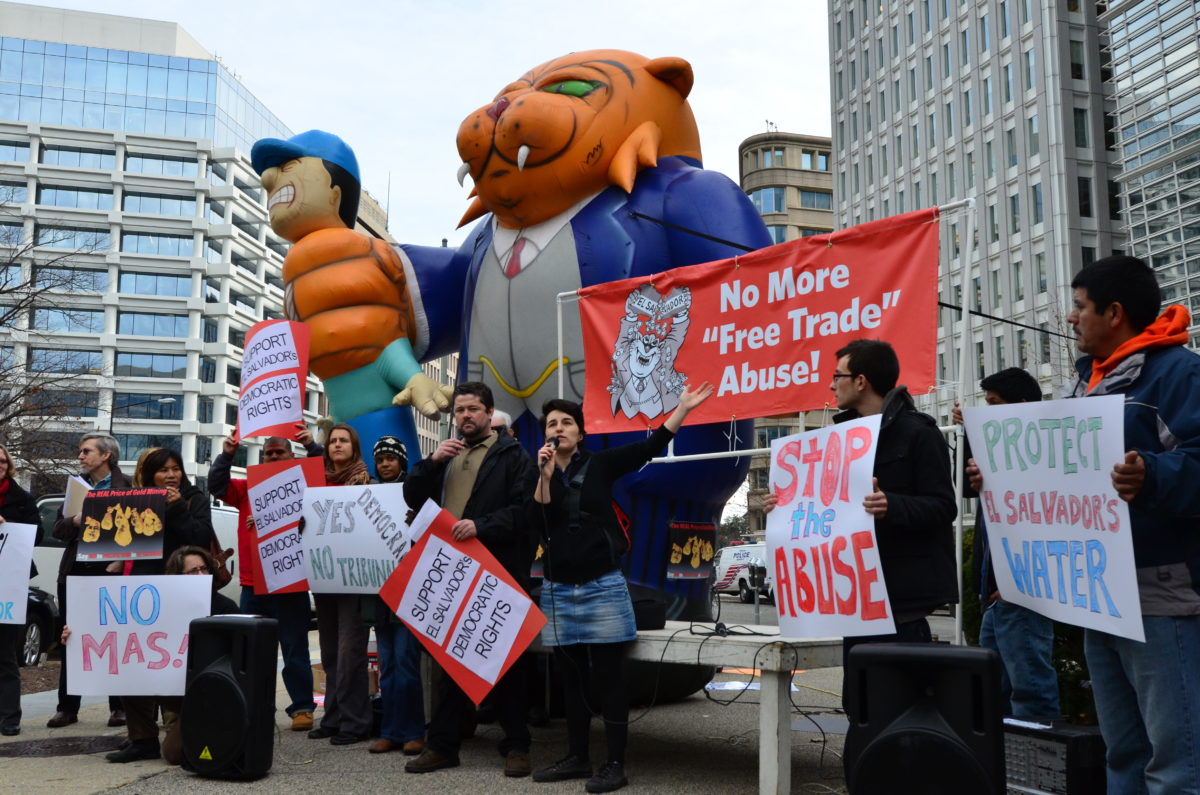
Environmentalists threatened, murdered in El Salvador
Salvadoran environmentalists are fighting for a ban on destructive mining projects in the face of physical attacks at home, and legal attacks from abroad authorized by a U.S. trade agreement.
Since 2009, community leaders, staff of a local radio station and a priest have been threatened, assaulted, or intimidated for their efforts to protect El Salvador’s water, natural resources and livelihoods from harmful mining projects.
The latest outrage occurred on January 20, 2012. Father Neftalí Ruiz, a leader of the anti-mining movement, allowed into his home three young men who said they were interested in social work. Once inside, the men tied up his hands and feet. They searched his computer and went through his possessions. They stole his laptop, cell phones, and an external hard drive: all presumably containing information related to the anti-mining movement. The men did not ask for money. According to Father Neftalí, they maintained communication with a person who appeared to be directing the search of his home.
Since 2009, Father Neftalí has been repeatedly harassed because of his leadership role in the community. He is secretary of the board of the Environmental Committee of Cabañas (the CAC) and a member of the National Roundtable against Metallic Mining (the Mesa, in Spanish). Last year, he received death threats by text messages. Catholic Bishop Monsignor Francisco Sol said that this latest incident was not a “crime of common delinquency.”
In a press statement the Mesa said: “This new attack on the life, integrity and work of the CAC and National Roundtable against Metallic Mining forces us, once again, to express our energetic disapproval, as well as condemn the wave of persecution against environmentalists and human rights defenders who like, Father Neftalí, have suffered similar treatment since the beginning of the anti-mining struggle in El Salvador.”
The attack against Father Neftalí is unfortunately the latest in a history of violence in that region. In 2009, three activists opposed to mining in El Salvador were murdered:
- Gustavo Marcelo Rivera, co-founder of the Asociación Amigos de San Isidro Cabañas was tortured and murdered in June 2009.
- Ramiro Rivera, president of the Environmental Committee of Cabanas for the Defense of Water and Culture, was murdered along with Felicita Echeverria on December 20, 2009.
- Dora Alicia Recinos Sorto, 8 months pregnant, was murdered on December 26, 2009, by assassins who were in search of her husband. Her small child was also injured.
The irony of this tragic story is that after years of struggle by the Mesa and local communities, their increasingly successful anti-mining movement is threatened by a suit brought by the Pac Rim corporation under the Central American Free Trade Agreement with the United States.
Pac Rim went to El Salvador to mine gold using an environmentally dangerous cyanide leach process, which threatened to poison the water supply of poor communities. Pac Rim’s exploration activities affected local water streams in an already water-stressed country.
Pac Rim’s mining project and similar projects initiated by foreign investors set in train a tragic series of events. Some Salvadoran elites, in a ruthless quest for wealth, ignored the high environmental and social costs of mining, impacts that fall mainly on the less fortunate.
Despite the attacks on environmental and human rights defenders, the Mesa and its allies defended Salvadorans’ rights to water, life and a healthy environment. The Mesa engaged in a democratic, social dialogue demanding a ban on metals mining in El Salvador. In response, the government decided to undertake a strategic environmental impact assessment of mining in the country.
Also as a result of public pressure, Pac Rim was denied a mining permit by El Salvador, which is what led it to sue under the Central American Free Trade Agreement. A World Bank tribunal is hearing the case, and any day now, it will decide whether to accept jurisdiction. Friends of the Earth has called on the tribunal to throw out the Pac Rim case and has warned Congress and the U.S. Trade Representative about the threat that trade agreements like CAFTA pose to the environment and to the public interest. The investment chapter of CAFTA provides trans-national corporations like Pac Rim sweeping rights to challenge environmental measures and even claim monetary compensation.
But far from responding to these concerns, USTR is actually promoting more of the same by pursuing a CAFTA-style investment chapter for the Trans Pacific Partnership. The TPP is a proposed trade pact for countries around the Pacific Rim; it eventually could become one of the world’s largest trade agreements.
TPP negotiators must not ignore the tragedy in El Salvador. The sacrifices of Father Neftalí and the Mesa must not be in vain. The memory of Gustavo Marcelo Rivera, Ramiro Rivera, and Dora Alicia Recinos Sorto must be honored. The best way that TPP negotiators could do that is to ensure that companies like Pac Rim are not given extraordinary rights to wage legal attacks on governments acting in the public interest; and that the successful efforts of local communities engaging in peaceful, democratic processes are respected.
Related Posts
Ways to Support Our Work

Read Latest News
Stay informed and inspired. Read our latest press releases to see how we’re making a difference for the planet.

See Our Impact
See the real wins your support made possible. Read about the campaign wins we’ve fought for and won together.

Donate Today
Help power change. It takes support from environmental champions like you to build a more healthy and just world.